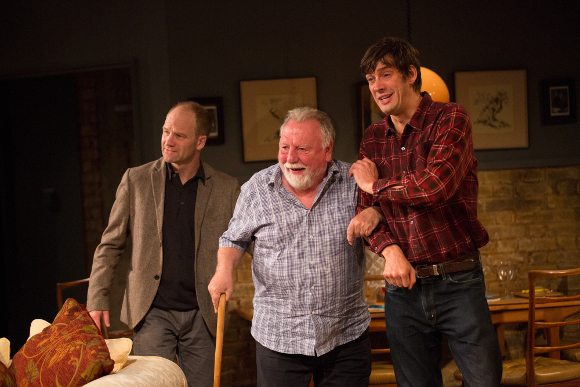The Herd

© Mark Douet
He has played Hamlet and Iago for the National Theatre, so Rory Kinnear knows a bit about family fall-outs and domestic chaos. Making his debut as a playwright, he spares us nothing in the rough and lacerating misery of the Griffiths family in a suburban living room.
It’s Andy’s twenty-first birthday, but Andy is severely disabled and mum Carol (Amanda Root) is going spare over the phone to his carers (“She works with the disabled and thinks she’s Jesus,” she spits out cattily) about his drugs and journey home for the party.
Claire (Louise Brealey), Andy’s 33 year-old sister, is fed up with mum and announces the imminent arrival of a boyfriend Mark (Adrian Bower, tall, rangy, affable) from Brighton.
Mark actually hails from Lancaster, but he works as a performance poet (with carpentry as a back-up) in Brighton – “where ambition goes to die” says Anna Calder-Marshall‘s interfering old grandma; she and grandpa, Kenneth Cranham‘s semi-incapacitated Brian, have come round to join the party and spread the agony.
Carol is in seriously sorry-for-herself mode, furious that Claire doesn’t help as much as she should – and Claire is furious about that, in return – and that her ex-husband Ian doesn’t help at all with Andy and hasn’t even seen him for five years.
So, guess what? Ian (Adrian Rawlins) turns up, too, receiving a frigid reception and a door slammed in his chops (oh, and a cut lip from another portal altercation, with a taxi door). Claire has some bombshell news and it’s no great surprise that it should provide another excuse for more climactic rows about parenting, marriage and responsibility.
Whereas Peter Nichols, in his brilliant black vaudeville A Day in the Death of Joe Egg, places the disabled child centre stage and milks a “special case” for all its savage repercussions, Kinnear – who has talked openly about the tragedy of his own quadriplegic elder sibling, and the struggles of his widowed mother – has written a more generally applicable dark comedy about family life.
He goes too far, and says the unsayable, as all good drama should. The accusatory tone between these big-hearted, petty-minded, terrifyingly normal people is one we all recognise and, if we don’t, we’re fooling ourselves. I’m not bracketing Kinnear with Eugene O’Neill, but there’s a similar quality of finding the blood in your own tears.
Howard Davies‘s production grips like a vice, developing painfully into a pretence at reconciliation and champagne jollity, with Cranham playing the spoons and quoting Shakespeare before the final kick in the teeth. I can’t recall a more savagely angry performance than Root’s as Carol, while Calder-Marshall queens it shockingly as a suburban Lady Bracknell in cardigans.
Keen to read more about the play? Check out our interview with Louise Brealey here.










